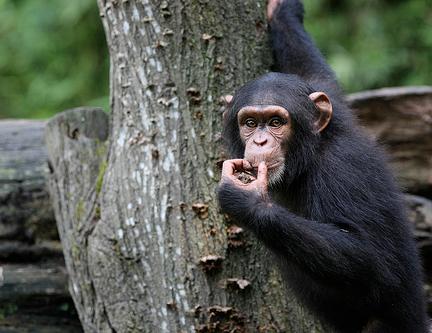Evolutionary roots of xenophobia
Chimpanzees are extremely territorial (Photo: Flickr user Shiny Things)
Story by Rhitu Chaterjee, PRI’s The World. Listen to audio above for full report.
Last month’s deadly attacks in Norway appear to have been an extreme outcome of a broader backlash against immigrants in parts of Europe.
This growing unease about immigrants raises a deeper question about such attitudes: Is it human nature to distrust those who come from outside our own community? Our primate ancestry may hold some answers.
“I think there’s probably a very deep-rooted fear and suspicion of outsiders,” says Michael Wilson, a primatologist at the University of Minnesota.
Wilson’s conclusion about people is based on his studies of chimpanzees, among our closest evolutionary relatives. If you look at chimps, he says, they are extremely territorial.
When two groups of chimps bump into each other in the forest, it always leads to conflict. Males threaten each other with loud calls and aggressive gestures. And, occasionally, things escalate to physical violence and warfare.
“If they can grab a member of the other community, they may beat on them, bite them and continue doing so until they’re very severely injured or killed,” says Wilson.
He says it makes sense chimps defend their territories. Several studies have shown that a bigger territory means more food for the group, and a better chance of survival.
But if chimps say anything about our own evolutionary past, so do bonobos. They’re a smaller species of apes, also closely related to us.
Primatologist Frans de Waal of Emory University has studied what happens when two groups of bonobos encounter each other.
“They have initial hostility, but then they have sex, and they groom, and very soon it looks more like a picnic than like warfare between them,” says de Waal.
No one really knows why bonobos are friendlier than chimps. It could be because bonobos live in forests with more food and therefore don’t need to protect their resources from neighbors, de Waal speculates.
So what do we make of our primate ancestry, when two of our closest evolutionary cousins are so different?
According to de Waal, what is common to these two species and all other primates is an acute awareness of who is an insider and who is an outsider.
“Sort of bred into the primate line is that you belong to a group and you don’t necessarily like outsiders,” he says.
And it is this ancient psychology that is at play when we go to war against neighboring nations, or when we clash with people from a culture or ethnicity different from our own, he added.
Read the rest of this story on The World website.
—————————————————————————–
PRI’s “The World” is a one-hour, weekday radio news magazine offering a mix of news, features, interviews, and music from around the globe. “The World” is a co-production of the BBC World Service, PRI and WGBH Boston. More about The World.
